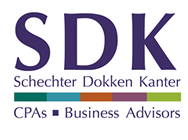Important Update: Corporate Transparency Act (CTA) Compliance
*The materials and information in this article have been prepared or assembled by SDK CPA and are intended for informational purposes only. SDK CPA will not provide guidance to clients on these matters or prepare any documents relating to this matter.
In a bid to enhance corporate transparency and combat financial crimes, the United States Congress passed the Corporate Transparency Act (CTA) as part of the National Defense Authorization Act for Fiscal Year 2021. The CTA, which came into effect on January 1, 2022, introduces significant changes to the way companies disclose their beneficial ownership information. As a business owner or representative, it is crucial to understand the implications of the CTA and how it may impact you and your business. It’s important to note that this law is not part of the Internal Revenue Code, and the required filings are not part of any tax filing with the Internal Revenue Service.
Understanding the Corporate Transparency Act
The primary goal of the Corporate Transparency Act is to prevent the illicit use of anonymous shell companies for money laundering, terrorism financing, and other financial crimes. Previously, individuals could establish companies without disclosing the true owners, creating a loophole that bad actors exploited. The CTA aims to close this gap by requiring corporations, limited liability companies (LLCs), and other entities to report beneficial owner information (BOI) to the Financial Crimes Enforcement Network (FinCEN).
What is Required?
- Information on BOI reporting can be found at https://www.fincen.gov/boi
- Entities formed before 2024 must file initial report by January 1, 2025
- Entities formed in 2024 must file their initial report within 90 days of formation
- Entities formed after 2024 must file their initial report within 30 days of formation
- If information on an initial report needs to be updated, an updated report must be filed within 30 days after the change occurs
- If previously reported information was inaccurate when filed, a corrected report must be filed within 30 days after the reporting company becomes aware of the error
Information to be provided about the company (initial report):
- The full legal name of the reporting company
- Any trade name or “doing business as” name of the reporting company
- A complete current address:
- In the case of a reporting company with a principal place of business in the US, the street address of such place of business, and
- In all other cases, the street address of the primary location in the US where the reporting company conducts business
- The state, tribal, or foreign jurisdiction of formation of the reporting company
- For a foreign operating company, the state or tribal jurisdiction where such company first registers, and
- The IRS taxpayer identification number of the reporting company
Information to be provided for beneficial owners and company applicants (initial report):
- The full legal name of the individual
- The date of birth of the individual
- A complete current address
- A unique identifying number and the issuing jurisdiction from one of the following documents:
- A non expired US passport
- A non expired identification document issued by a state, local government, or Indian tribe
- A non expired driver’s license issued by a state, or
- A non expired passport issued by a foreign government if the individual does not have any of the other documents
- An image of the document from which the unique identifying number was obtained
When an updated report is required:
- Reporting company meets the criteria for any exemption subsequent to the filing of an initial report
- Death of a beneficial owner
- Minor child beneficial owner attains the age of majority
- Change in information on an identifying document
- Any other change to the required information previously submitted to FinCEN
Which Entities Must File Reports?
- Corporations
- LLCs
- Other entities created by filing a document with a secretary of state or any similar office under the law of a state or Indian tribe
- A foreign corporation, LLC, or other entity formed under the law of a foreign country and registered to do business in any US state or in any Tribal jurisdiction
Who is Exempt?
The Act exempts 23 types of entities from reporting requirements. Details on the exemptions can be found online here. It is important to note that SDK cannot provide guidance on whether or not reports must be filed. This is something that must be determined by the entity itself or with the assistance of legal counsel. SDK can provide links to the provided resources, but will not be able to file any documents or reports on behalf of entities.
Who is a Beneficial Owner?
- Unless excluded, an individual who, directly or indirectly, through any contract, arrangement, understanding, relations, or otherwise
- Exercises substantial control over an entity, or
- Owns or controls 25 percent or more of the ownership interests of the entity
Beneficial Owner – Substantial Control
- Does not require ownership in the entity
- Substantial control exists if the individual:
- Serves as a senior officer of the reporting entity
- President
- Chief Financial Officer
- General Counsel
- Chief Executive Officer
- Chief Operating Officer
- Or any other officer, regardless of official title, who performs a similar function
- Has authority over the appointment or removal of any senior officer or a majority of the board of directors (or similar body)
- Directs, determines, or has substantial influence over important decisions made by the reporting company, or
- Has any other form of substantial control over the operating company
- Serves as a senior officer of the reporting entity
Beneficial Owner – Ownership Interests
- Any equity, stock, or similar instrument; preorganization certificate or subscription; or transferable share of, or voting trust certificate, or certificate of deposit for, an equity security, interest in a joint venture, or certificate of interest in a business trust; in each such case, without regard to whether any such instrument is transferable, is classified as stock or anything similar, or confers voting power or voting rights
- Any capital or profit interest in an entity
- Any instrument convertible, with or without consideration, into any share or instrument described above, any future on any such instrument, or any warrant or right to purchase, sell, or subscribe to a share or interest described above, regardless of whether characterized as debt
- Any put, call, straddle, or other option or privilege of buying or selling any of the items described on the previous slide without being bound to do so, except to the extent that such option or privilege is created and held by a third party without the knowledge or involvement of the reporting entity, or
- Any other instrument, contract, arrangement, understanding, relationship, or mechanism used to establish ownership
- Among others, includes with regard to a trust or similar arrangement that holds such ownership interest:
- A trustee or other individual with the authority to dispose of trust assets
- A beneficiary who:
- Is the sole permissible recipient of income and principal from the trust, or
- Has the right to demand a distribution of or withdraw substantially all of the assets from the trust, or
- A grantor or settlor who has the right to revoke the trust or otherwise withdraw the assets of the trust
- Among others, includes with regard to a trust or similar arrangement that holds such ownership interest:
Beneficial Owner – Excluded Individuals
- A minor child, as defined in the state in which the entity is formed, if the information of the parent or guardian of the minor child is reported
- An individual acting as a nominee, intermediary, custodian, or agent on behalf of another individual
- An individual acting solely as an employee and whose control over or economic benefits from the entity is derived solely from employment (does not cover senior officers)
- An individual whose only interest in an entity is through a right of inheritance, or
- A creditor, unless the creditor meets the requirements of ownership discussed earlier (simply being a creditor does not make someone a beneficial owner)
What are Potential Reporting Violations?
Failure to comply with the CTA’s reporting requirements may result in significant penalties. Individuals who knowingly provide false information or willfully fail to report accurate information may face fines, imprisonment, or both.
Potential civil and/or criminal penalties
- It is unlawful for any person to:
- Willfully provide, or attempt to provide, false or fraudulent beneficial ownership information, including a false or fraudulent identifying photograph or document, or
- Willfully fail to report complete or updated beneficial ownership information
- The civil penalty is not more than $500 per day that the violation continues or has not been remedied (there is no cap on this penalty)
- The criminal penalty is a fine of not more than $10,000 and/or imprisonment for not more than 2 years
The Corporate Transparency Act has the potential to impact many organizations and entities. Staying informed about the CTA and ensuring you are adhering to the reporting requirements will be key going forward. It is crucial to note that the CTA is designed to combat financial crimes, and compliance will contribute to a more transparent business environment. Again, it’s important to note that this law is not part of the Internal Revenue Code, and the required filings are not part of any tax filing with the Internal Revenue Service. If you have any questions on the CTA, feel free to reach out to us and we can provide links to materials and references. Call us today at 612-332-5500 or through email at info@sdkcpa.com.


